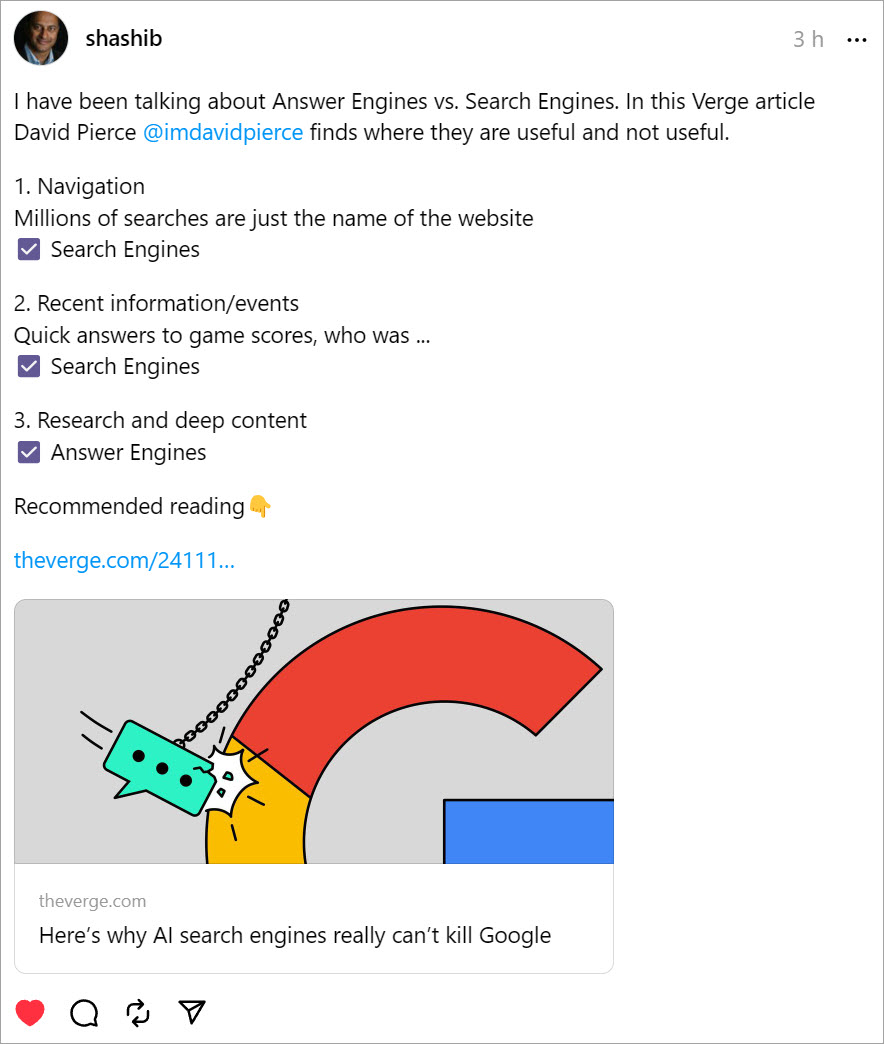
Today, we’re witnessing a pivotal transformation in how we search for and interact with information online. With established AI chatbots like ChatGPT and new entrants like Perplexity gaining prominence, the narrative of search is rapidly evolving, presenting a mix of opportunities and challenges for giants and newcomers in the search industry.
This transformation is spurred by emerging AI technologies and strategic moves by major companies like Microsoft and Baidu, indicating a shift towards more conversational, AI-driven search experiences. Google has been the primary gateway to the Internet for the last 20 years, processing around 100,000 web searches every second. But its longstanding dominance in search is under threat, with its moves involving the introduction of its AI chatbot Gemini and investments in AI startups under scrutiny.
The big picture also highlights the broader implications of this shift, including the technological and financial challenges of AI-assisted searches, changes in user behaviour with younger demographics turning to social media for information, and the strategic necessity for Google to innovate within a rapidly changing market.
This is the broad theme that Shel Holtz and I discussed in episode 396 of our For Immediate Release podcast, published on 27 March. I set the scene for our discussion with a narrative summary of three recent news articles.
CMS Wire asks, “Is the era of search engines coming to an end?”, citing a press release from Gartner on this very question that says traditional search engine volume will drop 25% by 2026, with search marketing losing market share to AI chatbots and other virtual agents.
The Register says, “Search engine results are getting worse”, citing a study published earlier this year by German researchers.
And The Economist weighs in with a lengthy essay asking, “Is Google’s 20-year dominance of search in peril?”
Using Perplexity Pro to summarise the three articles, and then combine the different perspectives in each article into a single new narrative summary, I developed these talking points for our discussion:
- The Challenge to Google’s Throne: Long regarded as the Internet’s primary gateway, Google’s dominance is being tested. Microsoft’s significant investment in OpenAI and the integration of AI into Bing then CoPilot signal a potential shift, urging Google to innovate or risk losing ground.
- AI’s Disruptive Wave: The integration of AI into search, exemplified by Microsoft’s Bing and Baidu’s initiatives, signifies a move towards more dynamic, conversational interactions with digital platforms. Google’s initial response with Gemini, its AI chatbot, underlines the competitive urgency.
- Changing Consumer Behaviours: The narrative also touches on the broader landscape of search, where platforms like Amazon and Apple carve niches, mainstream media companies create their own AI chatbots, and social media channels become alternative search venues for the younger demographics.
- Technological and Financial Implications: AI-enhanced searches offer a new frontier in search technology, raising questions about monetization and the future of advertising in search.
- Strategic Innovations: The discussion extends to the strategic imperatives for established players like Google, emphasizing the need to balance innovation with the risk of cannibalizing existing profitable models.
- The Future of Search: As we move forward, the search industry is set to become more conversational, personalized, and AI-driven, reshaping user interactions and expectations.
The overall narrative I used not only presents a snapshot of the search industry’s current state and future possibilities as seen by three publications but also showcases the methodical approach I used to synthesize three diverse viewpoints into a single coherent story with the help of an AI tool.
The Other Side of the Coin
During our discussion, Shel introduced an opposite view of the landscape, one in which others argue that Google will not be displaced from its dominant position in search anytime soon. He cited an article in Forbes quoting research from Edelman that discusses a decline in public trust towards AI, highlighting concerns around ethics, security, and transparency.
According to Forbes, as AI technology advances, public trust seems to be waning, with a notable decline in the US. The concerns aren’t only about AI’s accuracy but also its ethical implications and transparency. This underscores the importance of developing AI in a way that prioritizes ethical considerations, security, and transparency to rebuild and maintain public trust. Forbes says this is essential for AI’s integration across various domains, including search, where trust in the technology’s ethical use and decision-making processes is paramount
An article in The Verge waxed lyrical on why AI search engines really can’t kill Google, suggesting that while AI search tools are getting better, they don’t yet understand what a search engine is and how we really use them.
The Verge article argues that AI search tools, while improving, fail to grasp the full spectrum of tasks a search engine performs, from simple navigational queries to complex information searches. The Verge’s tests reveal that for basic navigational and real-time information queries, Google’s speed and accuracy remain unmatched.
However, The Verge says, AI search engines show promise in delivering concise answers to specific questions, potentially offering a more streamlined search experience for certain types of information. This critique underscores the complexity of replacing or even competing with Google’s search engine, highlighting the technological and practical challenges AI search tools face in meeting the diverse needs of users.
I think this timely comment in a Threads post by Shashi Bellamconda sums up some current viewpoints pretty well.

Irresistible Momentum
In acknowledging the concerns raised in Forbes and The Verge regarding public trust and the current capabilities of AI in search, it’s important to consider these challenges as part of the evolving landscape of technology.
Despite these hurdles, I’d argue that the momentum behind AI’s integration into search is undeniable and irresistible.
The shift towards more intuitive, conversational AI-driven search experiences reflects a broader transformation in how we access and interact with information. While the path forward may require navigating issues of trust, transparency, and technological refinement, the evolution of search technology suggests that the traditional paradigms of search are indeed on the cusp of significant change.
I think my view on this aspect is best expressed in this self-awareness statement by Perplexity itself:
Perplexity, as an AI-driven answer engine, represents a significant development in how users interact with information and seek answers online. It is part of the broader trend towards more sophisticated, conversational, and context-aware AI technologies that aim to improve the accuracy, relevance, and personalization of search results. By leveraging advanced natural language processing and machine learning algorithms, Perplexity and similar platforms are designed to understand complex queries, provide concise and informative answers, and enhance the overall user experience in obtaining information.
Perplexity AI, 24 March 2024
That’s quite clear it’s about a lot more than the simple questions or keywords that Google search as we know it today is accustomed to.
As AI continues to redefine the boundaries of search, businesses and users alike must adapt to a landscape where information retrieval becomes more interactive and nuanced, presented with transparency and authenticity, and tailored to individual needs.
Here are examples illustrating the shift:
- Conversational Interfaces: Tools like Perplexity and ChatGPT offer a conversational approach, allowing users to ask questions in natural language and receive answers that feel more like a dialogue than traditional search results.
- Personalized Responses: AI can tailor search results based on a user’s past interactions, preferences, and even the context of their queries, providing more relevant and personalized information.
- Complex Query Understanding: Unlike traditional search engines, which often rely on keywords, AI-driven search can understand the nuances and intent behind complex queries, offering answers to more intricate questions.
- Integration Across Platforms: AI search capabilities are being integrated into various platforms beyond web browsers, such as virtual assistants, social media platforms, and even IoT devices, making access to information seamless across devices.
- Knowledge Synthesis: AI can synthesize information from multiple sources to answer questions that don’t have straightforward answers, providing summaries, comparisons, and analyses that would take humans much longer to compile.
You can listen to Shel and me discuss this overall topic (including a lively exchange of different views in places – we don’t always agree in our discussions) right here. If you don’t see the embedded player below, listen on the FIR website.
If you have opinions on this topic, or any aspect of our discussion, do share your views. You can email a comment to us. Share your experiences with us on AI in search. Or why not join the conversation in our new Discord community? You can request access on Discord.
Related Reading:
- The Future of Online Search: A Closer Look at Perplexity AI – 5 February 2024
Footnotes:
1/ The image at the top was created and generated by DALL-E 3 via ChatGPT Pro. My simple prompt to ChatGPT was “Create a square image with a futuristic perspective on the subject of ‘The Future of Search in the Age of AI Chatbots’.”
ChatGPT’s explainer of DALL-E 3’s creation was this:

Envision a bustling, neon-lit cityscape at night, symbolizing the vast expanse of digital information. In the foreground, a sleek, holographic interface displays a variety of search queries floating in mid-air, interacted with by users through gestures and voice commands. These queries dynamically change and adapt, showcasing the AI’s ability to anticipate and refine search needs in real time. The users, diverse in appearance, represent the global reach and accessibility of this future search technology.
The atmosphere is one of harmony between humans and technology, where AI chatbots serve as intuitive, responsive guides through the endless sea of information, making the search experience more efficient and tailored to individual needs. The overall tone conveys a sense of advancement, connectivity, and optimism for the future of search in the age of AI chatbots. The image is rich in detail, with a focus on the interaction between users and the holographic AI interface, set against the backdrop of a futuristic city.
2/ I edited this post on 29/3/24 to add a numbered list of five examples of the shift we are seeing; it appears in the narrative just before reference to the FIR podcast episode. Number 5 in this list is precisely what I did with Perplexity combining summaries of three separate articles into a new narrative article, and then creating a list of talking points.











